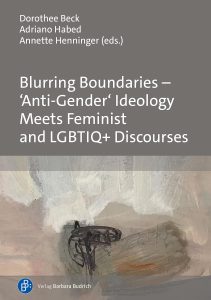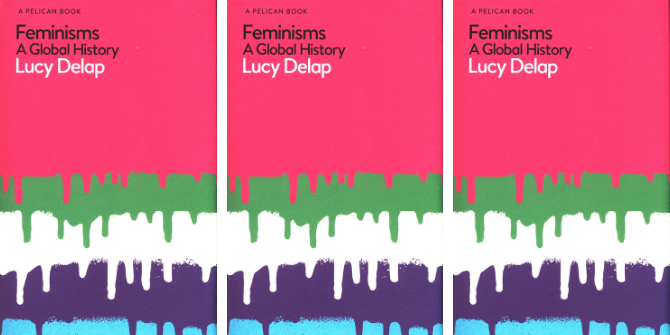In Blurring Boundaries – ‘Anti-Gender’ Ideology Meets Feminist and LGBTIQ+ Discourses, Dorothee Beck, Adriano José Habed and Annette Henninger assemble essays that conceptualise and reflect on emerging anti-gender, anti-feminist and anti-LGBTQIA+ ideologies and explore means of resisting them. These methodologically diverse (though geographically limited) interventions offer critical insights on how blurring discursive boundaries and building coalitions can combat anti-gender and other discriminatory movements.
 As the movements against women’s and LGBTQIA+ rights continue, alarmingly, to gather momentum, how can scholars and researchers fight back? This is the question which animates the contributions collected in Blurring Boundaries – ‘Anti-Gender’ Ideology Meets Feminist and LGBTIQ+ Discourses.
As the movements against women’s and LGBTQIA+ rights continue, alarmingly, to gather momentum, how can scholars and researchers fight back? This is the question which animates the contributions collected in Blurring Boundaries – ‘Anti-Gender’ Ideology Meets Feminist and LGBTIQ+ Discourses.
In their introductory essay, editors Adriano José Habed, Annette Henninger and Dorothee Beck offer readers a comprehensive overview of the existing literature on anti-gender, anti-feminist and anti-LGBTQIA+ ideologies. Importantly, they emphasise the ethnocultural underpinnings of such discourses, arguing for “new forms of coalitional politics” to counter broader crises of governance, representation and identity within liberal democracies. Hence, the editors propose “blurring boundaries” as a means of first identifying the specific manifestations of anti-gender, anti-feminist and anti-LGBTQIA+ discourse, so as to better understand, and thus, combat them. They argue, for instance, against assuming that anti-feminism and anti-genderism do not share points of overlap with Trans-Exclusionary Radical Feminism (TERF) positions on the basis of terminology (so-called “gender critical” feminists invoke the mantle of feminism, after all). They caution, too, against making value judgements as to what constitutes “good” or “bad” politics. Laudable as this critical nuance is, however, I cannot help but wonder, as a trans* reader, if sometimes we cannot simply call a spade a spade: the Holocaust denialism often espoused by TERF figures, to give but one example, is morally indefensible.
The collection’s strength lies above all in the diverse array of methodologies used. Each essay is meticulously researched, exhibiting a forensic attention to detail and a robust commitment to self-reflexivity
The collection’s strength lies above all in the diverse array of methodologies used. Each essay is meticulously researched, exhibiting a forensic attention to detail and a robust commitment to self-reflexivity. In the spirit of the editors’ introduction, the authors challenge assumed boundaries: Judith Goetz, for instance, considers the seldom-discussed role of transgender persons in far-right movements through a study of Germany’s Alternative für Deutschland (AfD). Goetz proposes the term “trans-chauvinism” to describe the racialised vision of German identity, and national superiority, which trans* individuals use to distinguish themselves from the “Muslim Other” (and, marshalling dualist, transnormative arguments, from “bad” trans* subjects, too). Patrick Wielowiejski and Edma Ajanović examine similar discursive turns in their analyses of ethnosexism (the ways in which ethnicised “Others” are painted as regressive or violent in their attitudes to sex, gender and sexuality) and femonationalism, defined by Ajanović as “the instrumentalization of feminist themes to promote racism as well as join the broader trend of Muslim and anti-migration/asylum discourses”, within the AfD and the Austrian Österreichische Volkspartei (ÖVP), respectively. In particular, Wielowiejski’s Gramscian diagnosis of a far-right, ethnosexist “common sense” proves revelatory. Elsewhere, Gadea Méndez Grueso makes a compelling argument for understanding both “anti-gender” and TERF movements through the lens of populism studies – a perspective which, going beyond the often-restrictive labels of left and right, might better equip us to combat anti-trans* and anti-LGBTQIA+ ideologies.
Gadea Méndez Grueso makes a compelling argument for understanding both “anti-gender” and TERF movements through the lens of populism studies – a perspective which, going beyond the often-restrictive labels of left and right, might better equip us to combat anti-trans* and anti-LGBTQIA+ ideologies.
As Méndez Grueso’s contribution reminds us, scholarly investigation into such movements cannot afford to abstract itself from the urgent material contexts of its production and dissemination. Funda Hülagü’s chapter is a masterful example of how scholarship can, and should, speak directly to a collective project of political emancipation. Hülagü examines the “discursive entanglements” between contemporary anti-feminism and popular feminism in Turkey, offering a concise analysis of the specific modes of household formation and neoliberal governance presently operative in the country. Hülagü calls for an “offensive” activism which critically examines “the social core of very social problems” – in short, for an entirely new approach to conceptualising the ongoing “crisis of social reproduction” in the country, eschewing the psychologising and moralising frameworks of the present debate. Somewhat frustratingly, given the scope of the volume as a whole, Hülagü’s analysis says little about queer and trans* domesticities; Dilara Çalışkan’s research into the kin-making practices of transgender mothers and daughters in Istanbul, for instance, might provide an intriguing counterpoint to an otherwise heteronormative narrative, allowing us to sketch out what a trans-inclusive feminist movement might look like in the Turkish context.
The transnational dimensions of the anti-gender movement have been well documented, and whilst not entirely absent from the discussion, these broader currents merit further comparative analysis along the lines drawn
To be sure, Hülagü’s intervention is also conspicuous in that it breaks with a troubling emphasis on western European experiences in this collection. In what is perhaps a reflection of the editors’ own research networks, perspectives from German-speaking regions are somewhat overrepresented, accounting for more than half of the case studies under examination. This is not to deny the vital import of each individual contribution; nonetheless, this geographical skewing affords limited space to studies of anti-LGBTQIA+ and anti-feminist politics outside western Europe (nor, indeed, to the powerful writing emerging in Francophone and Scandinavian contexts). Instead, this project of Blurring Boundaries leaves national borders largely intact. The transnational dimensions of the anti-gender movement have been well documented, and whilst not entirely absent from the discussion, these broader currents merit further comparative analysis along the lines drawn, in this collection, by Christine M. Klapeer, Inga Nüthen and Maryna Shevtsova; forthcoming works by Judith Butler and Susan Stryker – pioneering voices in queer and trans studies, respectively – may prove useful to read alongside the essays collected in this volume.
In the continuing struggle against misogyny, transphobia and anti-LGBTQIA+ ideologies, we would do well to draw on the vigilance and care which these essays exemplify.
Hopefully, the publication of Blurring Boundaries will galvanise further research at this pivotal moment for feminism, as well as for queer and trans studies. Expanding our scholarly perspectives is essential if we are to avoid the “blind spots” of our own research, as Koen Slootmaeckers reminds us in the roundtable discussion which closes out the volume. What is less certain, however, is the role which “blurring boundaries” might come to play in this – a question broached by Henninger and Slootmaeckers in that same conversation. I am minded to agree with Slootmaeckers’ suggestion, that this somewhat nebulous phrase be taken up as an “invitation to reflect” on our own analytical approaches, rather than serving as an analytical concept in its own right. Ultimately, Blurring Boundaries is a collection of great import for scholars and activists alike. In the continuing struggle against misogyny, transphobia and anti-LGBTQIA+ ideologies, we would do well to draw on the vigilance and care which these essays exemplify. To do so is to reaffirm a shared commitment to political liberation in these most urgent of times.
Note: This post gives the views of the author, and not the position of the LSE Review of Books blog, or of the London School of Economics and Political Science.
Image credit: Julia Tulke on Flickr.







